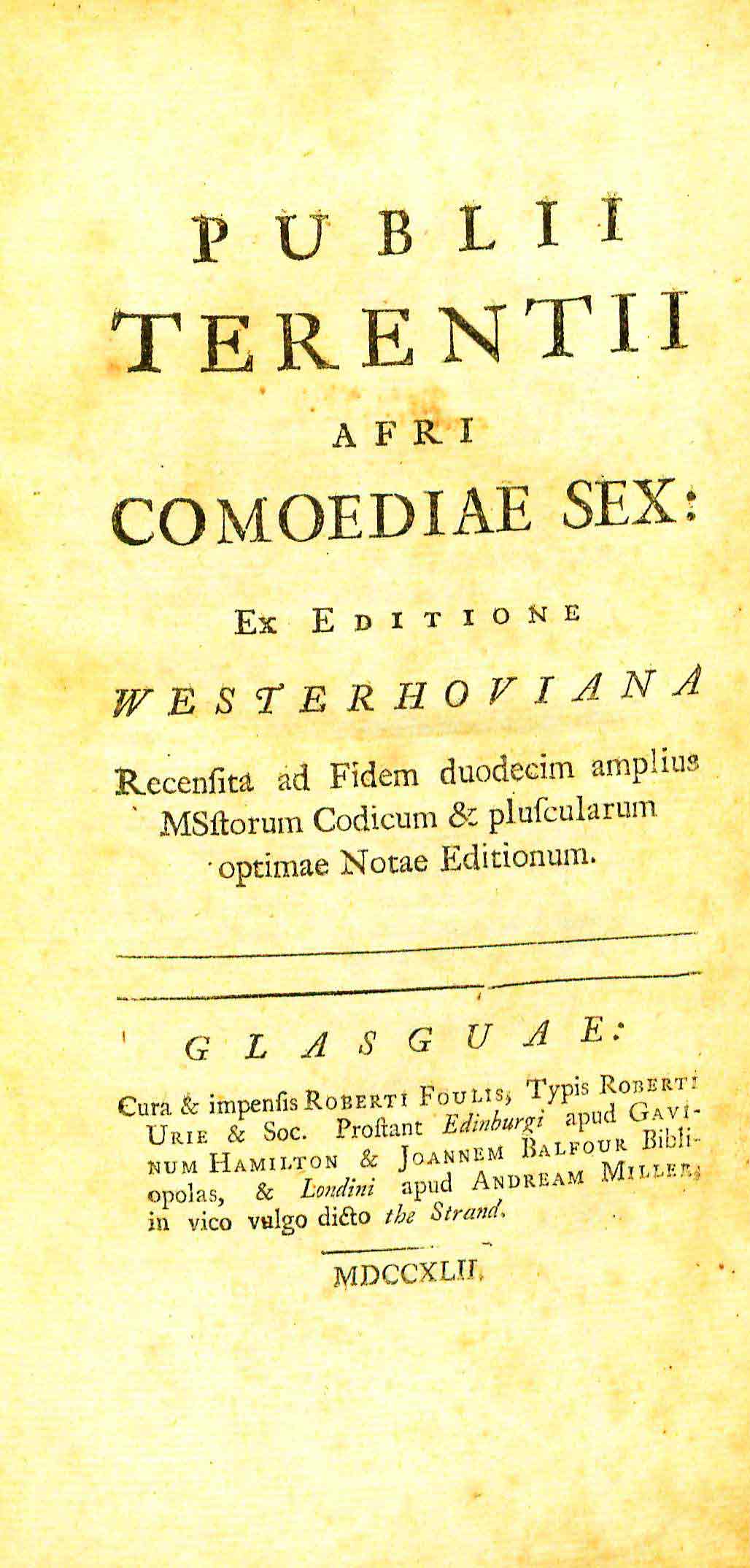Publii Terentii Afri Comoediae Sex
Publii Terentii Afri Comoediae Sex: Ex Editione Westerhoviana Recensita Ad Fidem Duodecim Amplius Msstorum Codicum & Pluscularum Optimae Notae Editionum
by Terence
Publius Terentius Afer, “Terence,” was a Roman comedic writer. The limited information known about his life comes from a biography by Suetonius and commentary by Donatus, however neither source can be confirmed as entirely accurate.[1] Terence was born in Carthage and went to Rome as a slave in a senator’s household, but was soon freed and patronized by prominent Romans.[2] Terence himself speaks in his works with pride about his support by Cornelius Scipio Africanus, the great Roman general from the Second Punic War.[3] Sources differ about the age of Terence upon his death, supposedly at sea returning to Rome from Greece, but he was either 24 or 34 when he passed in 159BCE. Similarly to Plautus, Terence used original Greek comedy as inspiration for his own works, though he followed them more closely, and kept the settings and specific topics Greek rather than changing them to fit a Roman theme. Terence attempted to create more natural and realistic Latin plays with more dialogue and no prologues (instead putting key background information into the actions and dialogue itself).[4] He consequently was a key developer of literary Latin with a more every-day, conversational tone.[5] Though Terence was not widely appreciated by the Roman public, his works were admired by critics such as Cicero and Horace.[6] All six of the plays that Terence wrote are extant: Andria (‘Girl from Andros’), Hecyra (‘Mother-in-law’), Heauton timorumenos (‘Self-tormentor’), Eunuchus (‘Eunuch’), Phormio, and Adelphoe (‘Brothers’). [Ibid.][7]
This work contains all six of Terence’s plays. It was published by two well-known and regarded Scottish publishers. Robert and Andrew Foulis (ne Faulls) were brothers who opened their own publishing company and printing press in 18th century Glasgow.[8] Robert was a barber before enrolling in University of Glasgow courses, while Andrew “received a more regular education…[as] a student of Humanity” who taught Greek, Latin and French for a time after he graduated.[9] The brothers began as booksellers and then transitioned to publishing and printing books, with Robert initiating each endeavor before later being joined by Andrew.[10] In 1740-42, Robert had other printers print what he chose to publish, but began printing his own books in 1742 which continued until his and his brother’s deaths in 1775 and 1776, respectively, when Andrew’s son Andrew took over The Foulis Press.[11] The Foulis Press primarily produced text books and other “works of learning…and of general literature,” as it was the printer to the University of Glasgow.[12] The press is unique for the plethora of variant issues and editions of published books on special paper, in special font, or even on copper plates.[13]
| Publii Terentii Afri Comoediae Sex | |
|
Title page from Publii Terentii Afri Comoediae Sex, George Wythe Collection, Wolf Law Library, College of William & Mary. | |
| Author | Terence |
| Published | Glasguae: Cura & impensis Roberti Foulis, typis Roberti Urie & soc. |
| Date | 1742 |
| Language | Latin |
Evidence for Inclusion in Wythe's Library
Description of the Wolf Law Library's copy
Rebound in modern half gray morocco and marbled papercovered boards with black leather spine label gilt. Purchased from Between the Covers-Rare Books, Inc.
References
- ↑ "Terence” in The Oxford Companion to Classical Literature, ed. by M.C. Howatson (Oxford: Oxford University Press, 2011).
- ↑ "Terence” in Oxford Dictionary of the Classical World, ed. by John Roberts (Oxford: Oxford University Press, 2007).
- ↑ "Terence”
- ↑ Ibid.
- ↑ "Terence”
- ↑ "Terence”
- ↑ Ibid.
- ↑ David Murray, Robert & Andrew Foulis and the Glasgow Press with some account of The Glasgow Academy of the Fine Arts (Glasgow: James Maclehose and Sons, Publishers to the University), 8.
- ↑ Ibid at 3.
- ↑ Ibid 6-10.
- ↑ Philip Gaskell, A Bibliography of the Foulis Press, 2nd ed. (Winchester, Hampshire, England: St Paul's Bibliographies, 1986), 190.
- ↑ Ibid 17-18.
- ↑ Ibid 18-19.
